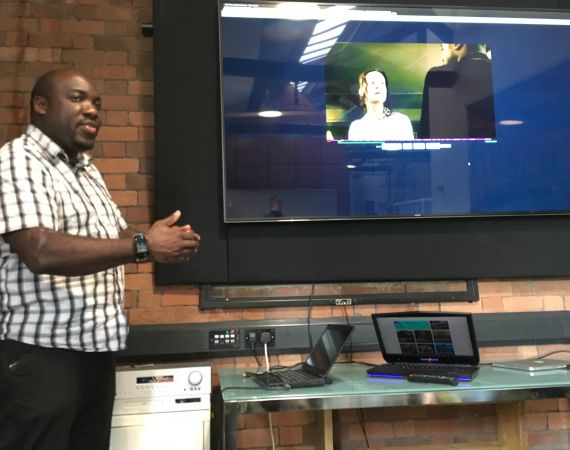Lunchtime talk write-up
Posted on Sat 9 Jul 2016
Doing things for a purpose through the (new) medium of broadcasting
From virtual reality uprisings to cooking shows that respond as you slice and dice, the team at BBC R&D share their very latest experiments and ideas.

Ian Forrester introduces Visual Perceptive Media
Posted by
On Friday 8 July, Phil Stenton, Si Lumb and Ian Forrester from the BBC’s Research and Development team joined us to share some of the experimental, future gazing ideas that they are excited by at the moment. Here are just a few to give you a taste of what they are up to:
Squeezebox - relevant content to fill unused ad space
When the BBCs programmes are sold abroad they are often shown with advert breaks. Connected Studios have been looking into intelligent solutions to what to do with unsold advertisement slots and have developed the ‘squeezebox’ prototype, a system that delivers montaged, high quality BBC content, of the perfect length for the unsold space, that has contextual links to the main programming.
Responsive Radio - content that reassembles itself according to how much time you have.
This is a new approach to personalised radio. The team have been experimenting with breaking down radio content into ‘atoms’ of stories and using intelligent tagging and editing algorthyms, creating a system by which they can be re-assembled to make a compelling piece of programming that is exactly the length of time that the user has to listen. If you only have a couple of minutes, or ten minutes, or 13.5 minutes to catch up on the latest documentary, fine. And if you fancy stretching out and committing an hour to hear the whole story, great.
Visual Perceptive Media – Alter the feel of a piece according to your own tastes
Ian showed us a demo called ‘The Break Up’ in which a companion app asks you questions and assesses your tastes to enable you to choose the tone of the ensuing piece and influence things like the music, grading, editorial style and emotional tone. The personalised piece is then compiled on the fly (not server side) and a scene with over 50,000 potentially variations will play out in front of you. The team have also experimented with changing those decisions mid-way through the content allowing you to tweek as things progress. Ian Forrester took us through a live demo which I seem to remember involved us choosing to empathise more with the female character, to a hip hop score, with a nostalgic overall feel.
Cook Play Kitchen – a cook-along programme in which the chef adapts to you
Using natural language processing and gestural interfaces, the team are experimenting with a new type of skills-based programme (in this case a cooking programme) in which the content responds to what you are actually doing in your on home, and the pace at which you are naturally progressing through a tutorial.
Easter Rising: Voice of a Rebel VR – virtual reality storytelling experience evoking this key moment in Irish history
Produced by Studio resident, Catherine Allen (see Catherine’s lunchtime talk on Easter Rising for more info) Easter Rising draws on storytelling traditions from TV, gaming and theatre to place you in the centre of an evolving story as one man recalls and plays out the dramatic events of the 1916 Easter Rising rebellion against British rule.
As well as looking at particular projects, we had a great conversation about VR that was too detailed and far ranging to do justice to here, but I wanted to share one point in particular: Si Lumb encouraged us to think about virtual reality as a range of different emerging mediums, each with their own challenges and opportunities. There is a big difference, for example between a 360 degree live action video documentary piece designed to be experienced sitting down; to a room scale, computer generated dramatic experience that utilises head mounted cameras and AR markers to make nearby friends’ clothing appear to dramatically ignite, Hunger Games style…just as a ‘for instance’! Many of us in the Studio are interested in expanding our understanding of user experience within VR at the moment so it was a great opportunity to kick off a conversation with the guys from the beeb and with our brilliant lunchtime talk audience.
On BBC Taster right now you can try out a number of the team’s experiments and give your own feedback to influence the future of broadcast.
